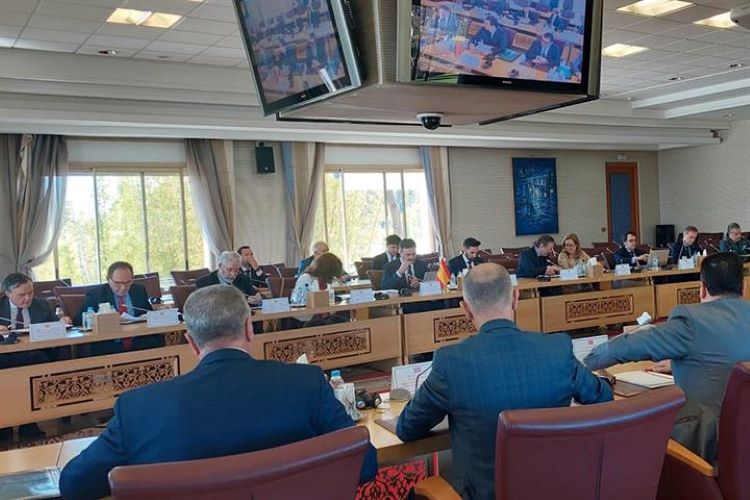The Diplomat
The Governments of Spain and Morocco held yesterday in Rabat the XX Meeting of the Permanent Spanish-Moroccan Group on Migration, one of the main commitments included in the roadmap agreed last April 7 during the meeting between the President of the Government, Pedro Sánchez and the King of Morocco, Mohamed VI.
This meeting, the twentieth held by the Permanent Group on Spanish-Moroccan Migration since its constitution in 2003, served to analyze the new challenges in migratory matters after the exceptional situation caused by the COVID-19 pandemic in the last two years. Likewise, the meeting allowed to focus the main points of collaboration between both countries in a key matter for the relations between Spain and Morocco. The meeting took place one day after the meeting in Rabat of the Spanish-Moroccan Joint Commission for the preparation of the Strait Crossing Operation (OPE) and while waiting for the meeting of the group on the delimitation of maritime borders to be convened.
The Spanish delegation was chaired by the Secretary of State for Migration, Jesús Javier Perea, and was attended by the Secretary of State for Security, Rafael Pérez, and the Secretary of State for Foreign and Global Affairs, Ángeles Moreno. The Moroccan delegation was headed by the Director of Migration and Border Surveillance, Khalid Zarouali.
During her speech, Ángeles Moreno reiterated the Spanish government’s willingness to speed up and streamline the granting of visas, as requested by Morocco, because this “is in the interest of both parties, by promoting orderly and regular mobility”. He also assured that Spain wants more and more Moroccan students to improve their academic training in Spanish institutions. The visa issue is one of the issues that remained paralyzed with COVID-19 and the bilateral diplomatic crisis. Almost three years ago, in June 2019, the then Minister of Foreign Affairs, Josep Borrell, made a commitment in Rabat with his Moroccan counterpart, Nasser Bourita, to strengthen consular services to deal with the growing number of Schengen visa applications.
For his part, Rafael Perez stressed the commitment of Spain and Morocco to continue strengthening bilateral cooperation on migration issues. “We are neighboring countries and strategic partners, the daily joint work has proved to be an example, especially in terms of controlling migratory flows and the fight against human trafficking networks,” he said. He also affirmed that “the best option” to address migratory flows is “bilateral cooperation with the countries of origin and with those who share this same challenge”.
Regarding the so-called Atlantic route, Perez highlighted the effectiveness of the joint work of return “as a disincentive to departures to the Canary Islands”, and as “an effective instrument in the dismantling of trafficking networks” and expressed his willingness to continue intensifying the effort in this area “with agility and flexibility”. The arrival of migrants by irregular means to the Canary Islands was reduced by 78% in the month of April with respect to those registered in January, according to the Ministry of the Interior. For his part, Jesús Javier Perea stressed during his speech the need to continue to support regular migration programs as a strategic objective for Spain and also for the European Union, especially after the Communication of the European Commission on April 27 in this regard.
Joint communiqué
According to the Moroccan state news agency, MAP, the two parties concluded their meeting with a joint communiqué in which Spain expressed its gratitude to the Moroccan authorities for the “far-reaching efforts” made in the fight against illegal migration with “tangible results”.
Also, faced with the common challenges posed by migrant smuggling networks and the unstable regional environment, the two parties decided to strengthen their coordination and information exchange mechanisms, in particular by renewing the modalities of common work at the level of police cooperation centers, liaison officers and joint patrols, and stressed the effectiveness of return work as a “disincentive element” in the fight against criminal migrant smuggling networks on the Atlantic and Western Mediterranean routes.
The two parties also attached “special importance to the growing possibilities of financial support for Morocco in the new multiannual financial framework of the European Union” and assured that Spain, as an EU Member State, “will continue to highlight the role of Morocco as a strategic partner of the European Union in all areas, including migration”.
The Joint Migration Group welcomed the “positive results” of the Moroccan-Spanish model of circular mobility and labor management, which is “one of the most solid and recognized examples of success at the European and international level”, and reiterated their shared will to strengthen the prospects of cooperation to promote controlled legal flows, in coordination with all operators and interveners.
They also recalled the contribution of the Moroccan community in Spain to the economic revival after the pandemic and “its plural contribution as a vector of cultural and civilizing rapprochement”, and the two parties undertook to work together with the aim of strengthening the integration of the communities of nationals of the two countries, both in Spain and in Morocco, and in particular that concerning the most vulnerable categories. On the issue of unaccompanied minors, Morocco recalled the High Royal Instructions for the repatriation of all duly identified Moroccan minors and the two parties advocated an approach focused on the best interests of the minor, especially through prevention and protection.







